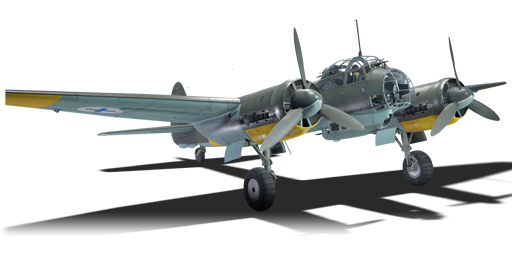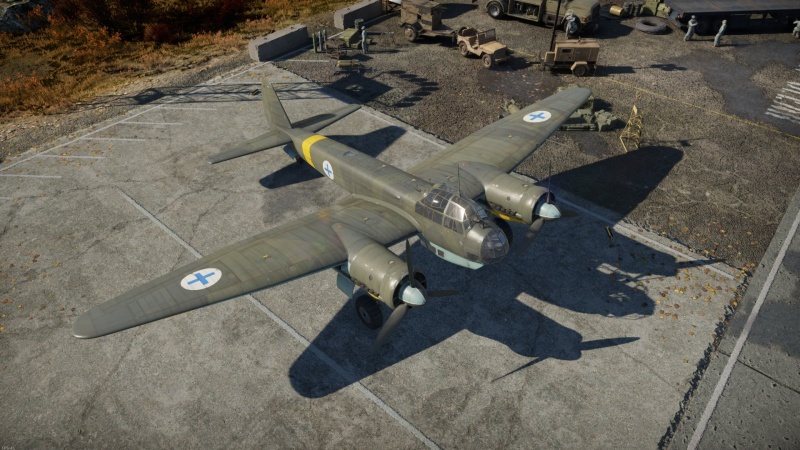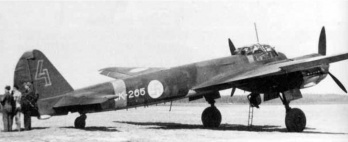Ju 88 A-4 (Sweden)
| This page is about the bomber Ju 88 A-4 (Sweden). For other versions, see Ju 88 (Family). |
Contents
Description
The ▄Ju 88 A-4 was a multirole combat aircraft with a twin engine configuration, this specific variant was placed under Finnish service in 1943. The A-4 variant was a very much needed improvement, longer wingspan, redesigned wingtips, stronger defensive armament, a more powerful engine, external bomb racks and reinforced undercarriage. Finland bought 24 Ju 88s during April 1943 and they were assigned to the No.44 squadron that was already experienced in twin engine bombers. The aircraft wasn't liked by the crews however, due to its complexity, crews stayed on the ground during most of 1943 in training, doing just a handful of raids and bombing missions into enemy territory.
It was introduced in Update "Fire and Ice". The ▄Ju 88 A-4 is just like its German counterpart, being very capable at dive bombing and horizontal bombing, it has a good speed for a bomber as well as air breaks to loose that speed quickly. It is a formidable bomber that its even capable of destroying bases in air matches, with a total payload of 2,400 kg, the defensive armament is also very decent and you can destroy some aircraft that try to intercept you. However it has some downsides, for example, while the defensive armament is good, it has a blind spot below the fuselage, since it does not have ventral gunners aiming down, the offensive armament is also extremely bad, with a single light machine gun facing forward.
General info
Flight performance
| Characteristics | Max speed (km/h at 5,600 m) |
Max altitude (metres) |
Turn time (seconds) |
Rate of climb (metres/second) |
Take-off run (metres) | |||
|---|---|---|---|---|---|---|---|---|
| AB | RB | AB | RB | AB | RB | |||
| Stock | 432 | 416 | 31.4 | 32.7 | 4.2 | 4.2 | 530 | |
| Upgraded | 479 | 455 | 28.7 | 30.0 | 10.2 | 6.8 | ||
Details
| Features | ||||
|---|---|---|---|---|
| Combat flaps | Take-off flaps | Landing flaps | Air brakes | Arrestor gear |
| ✓ | ✓ | ✓ | ✓ | X |
| Limits | ||||||
|---|---|---|---|---|---|---|
| Wings (km/h) | Gear (km/h) | Flaps (km/h) | Max Static G | |||
| Combat | Take-off | Landing | + | - | ||
| 457 | 428 | 280 | ~8 | ~8 | ||
| Optimal velocities (km/h) | |||
|---|---|---|---|
| Ailerons | Rudder | Elevators | Radiator |
| < 350 | < 360 | < 370 | > 330 |
Survivability and armour
- 58 mm and 60 mm Bulletproof glass around the dorsal turret
- 12 mm Steel plate behind the pilot
- 12 mm Steel plates around the ventral turret
- 20 mm Steel plate behind the cockpit
Modifications and economy
Armaments
Offensive armament
The Ju 88 A-4 (Sweden) is armed with:
- 1 x 7.92 mm MG 81 machine gun, nose-mounted (750 rpg)
Suspended armament
The Ju 88 A-4 (Sweden) can be outfitted with the following ordnance:
- 10 x 50 kg SC50JA bombs (500 kg total)
- 28 x 50 kg SC50JA bombs (1,400 kg total)
- 4 x 250 kg SC250JA bombs (1,000 kg total)
- 4 x 250 kg SC250JA bombs + 10 x 50 kg SC50JA bombs (1,500 kg total)
- 4 x 250 kg SC250JA bombs + 28 x 50 kg SC50JA bombs (2,400 kg total)
- 2 x 500 kg SC500K bombs (1,000 kg total)
- 2 x 500 kg SC500K bombs + 10 x 50 kg SC50JA bombs (1,500 kg total)
- 2 x 500 kg SC500K bombs + 28 x 50 kg SC50JA bombs (2,400 kg total)
- 1 x 500 kg SC500K bomb + 1 x 1,000 kg SC1000L2 bomb (1,500 kg total)
- 4 x Flam C 250 incendiary bombs
- 2 x Flam C 500 incendiary bombs
The Ju 88 A-4 can destroy 3 bases in Air Realistic without rearming .
Defensive armament
The Ju 88 A-4 (Sweden) is defended by:
- 2 x 7.92 mm MG 81 machine guns, dorsal turret (1,000 rpg = 2,000 total)
- 2 x 7.92 mm MG 81 machine guns, ventral turret (900 rpg = 1,800 total)
Usage in battles
The Finnish Ju 88 A-4 works just like its German counterpart, being able to both dive bomb and do horizontal bombing. The bomber has decent defensive armament and has a single offensive 7.92 mm MG 81 machine gun, which unfortunately won't really come in handy. You are able to carry up to 2,400 kg of bombs with this plane, making it a formidable bomber.
Air Battles:
In Air battles, you should either bring the 2 x 500 kg + 28 x 50 kg payload or the 4 x 250 kg + 28 x 50 kg payload as they fully use the Ju 88 A-4's potential and will do a great job at damaging enemy bases, airfields and even ground targets. As soon as you spawn in, start climbing to make sure you are safe from enemy fighters. The greatest threats to you will be the German Bf 109s with their astonishing climb rate, so remember to always check your surroundings.
Ground Battles:
In Ground battles you should ignore the 50 kg bombs as they won't do much against tanks and will only add weight to your plane, instead, bring 250 kg bombs, 500 kg bombs or the 1,000 kg bomb, these payloads won't use the Ju 88 A-4's full bomb capacity but they will make it more manoeuvrable and faster. Additionally, it is easier to hit ground targets with dive bombing tactics, so when you approach your target, extend the airbrakes ("H" by default) and reduce throttle if necessary to avoid too much speed which could result in your wings being ripped off.
Facing the Ju 88 A-4:
If you come across a Junkers 88 A-4, you will either be facing its cockpit or its tail most of the time. Attacking the bomber from below is also an option as it does not have any ventral gunners aiming down. If you are facing its cockpit, aim for the pilot as this will cause the plane to instantly be destroyed. If you are facing its tail, however, be careful with the gunners and aim for the engines, bombers won't go far without them. Since the Ju 88 A-4 gets a bomber spawn, it is recommended to use planes with good climb rates, such as the aforementioned Bf 109s.
Pros and cons
Pros:
- Excellent payload options
- Capable of dive bombing
- The 28 x 50 kg bombs are effective against light vehicle columns
- Fast-firing defensive armament
- Fast for a bomber aircraft
Cons:
- Limited offensive armament
- No ventral gunners aiming down, making it vulnerable to attacks from below
History
Finland acquired 24 Ju 88s during April 1943, at this time, the Continuation War was raging and Finland needed a new bomber to aid in the frontline and conduct operations deep in enemy territory. The bombers were assigned to the No.44 squadron that was experienced in twin engine bombers, since it had previously operated the Bristol Blenheim.
The pilots and rest of the crew stayed on the ground during most of the year, training and dealing with the complexity of the aircraft, which gained it a bad reputation between ground crews. Since this was the case, just a handful of missions were conducted in the form of raids and bombing runs. Some of this missions had mediocre results, with seven Ju 88s damaged in a raid on the Lavansaari air field. The aircraft was being used in dive bombing, which damaged the wings, and thus restrictions were placed, to avoid accidents, crews were only allowed to dive at a 45-degree angle, and they removed the air breaks to ensure this procedure was followed.
In 1944 the squadron was much more active, with a bombing raid on 9 March 1944 against Soviet Long Range Aviation bases near Leningrad, in this operation several Finnish aircraft, followed Soviet bombers to their bases, catching the Soviets unprepared and destroying many bombers and their fuel reserves. The most tense moment happened during Soviets fourth strategic offensive, in this situation the entire regiment was placed at high alert at all times and the aircraft provided air cover and damaged the logistics of the Soviet Union, flying several sorties every day.
The Ju 88s actually participated in the Lapland War against Germany, the now experienced crews targeted mostly vehicle columns that were retreating to Norway. Other units flew reconnaissance missions with photographic equipment, some of those missions required the pilots to fly into German air space in occupied Norway, were they gathered very important data on the German retreating progress.
After the wars, Finland was prohibited from using bomber aircraft with internal bomb stores. Consequently, the Finnish Ju 88s were used for training until 1948. After that they were scrapped during many years, no aircraft survived unfortunately, but some parts are on display at the Central Finland Aviation Museum and at the Finnish Aviation Museum in Vantaa.
Media
- Skins
See also
External links
| Junkers Aircraft and Motor Works (Junkers Flugzeug- und Motorenwerke Aktiengesellschaft) | |
|---|---|
| Fighters | Ju 88 C-6 · Ju 388 J |
| Strike Aircraft | |
| Ju 87 | Ju 87 G-1 · Ju 87 G-2 |
| Bombers | Ju 88 A-1 · Ju 88 A-4 · Ju 188 A-2 · Ju 288 C |
| Ju 87 | Ju 87 B-2 · Ju 87 D-3 · Ju 87 D-5 · Ju 87 R-2 · Ju 87 R-2 Libya |
| Export | ▄Ju 87 D-3 · ▄Ju 87 R-2 · ▄Ju 88 A-4 |
| Sweden bombers | |
|---|---|
| B3 | B3C |
| B17 | B17A · B17B · S17BS |
| SAAB 18 | B18A · B18B · T18B · T18B (57) |
| T 2 | T 2 |
| Finland | ▄Ar 196 A-5 · ▄Ju 88 A-4 |






